HRC Calls on State Department to Apologize for ‘Lavender Scare’
HRC has called upon the U.S. State Department to apologize to LGBTQ employees who were targeted, harassed…
Read moreDedicated To People, The Planet, and All Its Inhabitants – Since 1996

HRC has called upon the U.S. State Department to apologize to LGBTQ employees who were targeted, harassed…
Read moreToday, HRC blasted the House Freedom Caucus’ efforts to end two crucially important protections for…
Read more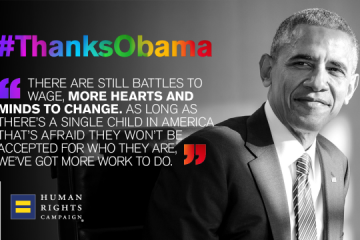
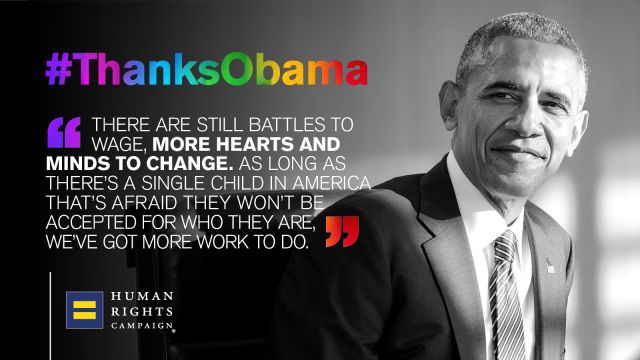
Viewed in full, Barack Obama’s legacy of achievement for LGBTQ people is unmatched by any president in American history. We’ve accomplished landmark victories from the courts to Congress, and through the implementation of executive policies that advance basic fairness.
As we prepare for Obama’s departure from the Oval Office in the coming month, we take a look back at some of the most impactful ways his Administration has advanced the cause of equal rights for all Americans — no matter who they are or who they love.
Here are a few of our favorites:
#1. President Obama signed into law the Matthew Shepard and James Byrd, Jr. Hate Crimes Prevention Act. The law gives the Justice Department the power to investigate and prosecute bias-motivated violence by providing the Justice Department with jurisdiction over crimes of violence where a perpetrator has selected a victim because of the victim’s actual or perceived race, color, religion, national origin, gender, sexual orientation, gender identity or disability.
#2. In an interview with ABC News’ Robin Roberts, Obama endorsed marriage equality. He said after speaking with own LGBTQ staff members, military service members — as well as his wife and daughters, Obama said he “just concluded that for me personally it is important for me to affirm that I think same-sex couples should be able to get married.”
#3. President Obama relegated America’s “Don’t Ask, Don’t Tell” ban on gay and lesbian service members to the dustbin of history. For 17 years, the law prohibited qualified gay and lesbian Americans from serving in the armed forces and sent a message that discrimination was acceptable. Obama’s DADT repeal meant that gay and lesbian Americans eager to serve their country, but unwilling to compromise who they are as individuals could, for the first time ever, serve openly.
#4. The Obama Administration threw its weight behind the movement to ban the harmful, widely debunked practice of “conversion therapy.” Valerie Jarrett, Senior Advisor to President Obama, spoke out against the practice and a few months later, the Substance Abuse and Mental Health Services Administration (SAMHSA) published a report calling for an end to so-called-“conversion therapy” for minors.
#5. President Obama signed a crucial executive order to protect LGBTQ workers from job discrimination along with a number of other significant policy or regulatory changes. The Obama administration has worked across all cabinet agencies to ensure LGBTQ Americans were fully included in the work of our federal government—resulting in LGBTQ workers, students, renters, immigrants, refugees, service members, patients, families and beyond having the full force of the administration at their backs.
#6. The Obama family celebrated the historic marriage equality ruling by lighting up the White House in rainbow colors. President Obama referred to it as one of his favorite moments of 2015. In press conference Monday President Obama said “I didn’t have the chance to comment on how good the White House looked in rainbow colors … to see people gathered in the evening on a beautiful summer night and to feel whole and to feel accepted and to feel they had a right to love, that was pretty cool. That was a good thing.”
A photo posted by The White House (@whitehouse) on Jun 26, 2015 at 6:52pm PDT
#7. President Obama appointed the first openly transgender White House staffer, Raffi Freedman-Gurspan as Outreach and Recruitment Director for Presidential Personnel in the White House Office of Presidential Personnel. Valerie Jarrett, senior adviser to President Obama, said, “Her commitment to bettering the lives of transgender Americans, particularly transgender people of color and those in poverty, reflects the values of the administration.”
#8. President Obama signed the first-ever federal law providing explicit LGBTQ non-discrimination protections in the 2013 Violence Against Women Act re-authorization. Time and time again, President Obama has advocated for legislation that explicitly includes protections for LGBTQ and other vulnerable communities who are victims of domestic violence.
#9. Time and time again, President Obama used the bully pulpit to stand up for the LGBTQ community. One of our favorite moments marked the first time a U.S. President referenced bisexual or transgender people in an official State of the Union address. He argued that the LGBTQ individuals deserve the same protections and rights as other Americans.
#10. Obama’s Administration on Aging released important guidance that empowers providers to consider LGBTQ older adults as a population of “greatest social need” — paving the way for increased services that significantly improve the health and well-being of this aging population. This step brought much-needed attention to the unique needs of LGBT older adults, and the urgent actions needed to maintain health and preserve their dignity.
#11. President Obama’s White House endorsed the Equality Act. The legislation would provide consistent and explicit anti-discrimination protections for LGBTQ people across key areas of life, including employment, housing, credit, education, public spaces and services, federally funded programs, and jury service. White House press secretary Josh Earnest said the “bill is historic legislation that would advance the cause of equality for millions of Americans.”
#12. Prior to the Olympic Games in Sochi, President Obama spoke out against Russia’s heinous anti-LGBTQ law. In an interview with Jay Leno on NBC’s The Tonight Show, President Obama condemned a Russian law that criminalizes even the most modest gestures of support for LGBTQ people. The President stated that such laws violate “the basic morality that I think should transcend every country, and I have no patience for countries that try to treat gays, or lesbians, or transgender persons in ways that intimidate them or are harmful to them.” He later sent a delegation comprised of openly LGBTQ athletes Billie Jean King, Caitlin Cahow and Brian Boitano to attend the games in his place.
#13. The Obama Administration established a federal task force on bullying that created StopBullying.gov. The website offers support and resources for LGBTQ youth and guidance on how to prevent and respond to bullying. The task force hosted the first-ever White House Conference on Bullying Prevention and funded an “It Gets Better” video to address LGBTQ youth at risk of depression and suicide.
#14. President Obama cheered on landmark Supreme Court cases. He even gave us a congratulatory call from Air Force One. Obama placed a call to HRC President Chad Griffin’s cell phone in order to offer his congratulations to Prop 8 plaintiffs Kris Perry & Sandy Stier and Paul Katami & Jeff Zarrillo following their decision. The call came as Perry and Stier were speaking to Thomas Roberts live on MSNBC. During the call which lasted two minutes and caller ID labeled “unknown,” the President expressed his thanks to the plaintiffs for their courage and determination in returning marriage equality to California. “We’re proud of you guys, and we’re proud to have this in California! And it’s because of your leadership things are heading the right way. So you should be very proud today.” The Administration had filed a brief in the Perry case arguing for an end to Proposition 8.
#15. President Obama signed the Affordable Care Act into law. Prior to the ACA’s passage insurance companies could discriminate against anyone due to a pre-existing condition. LGBTQ people could be turned away for being honest about being LGBTQ. And individuals with HIV and AIDS were particularly vulnerable to insurance industry abuses. Consistent with the goals of the President’s National HIV/AIDS Strategy, the Affordable Care Act achieved considerable strides in addressing these concerns and made quality, affordable care more accessible for all.
#16. President Obama’s administration has made a record number of appointments of LGBTQ judges and ambassadors. He has also championed more than 250 LGBTQ appointments to full-time and advisory positions in the federal government over the course of hise tenure — an important step for LGBTQ Americans who deserve a voice that speaks to their own at every level of government.
#17. Obama’s Education Department hosted five summits on ways to protect students from bullying and harassment. These events included an LGBT Youth Summit in 2011 and a meeting with transgender students in June 2015. Gatherings in these official capacities were previously unprecedented.
#18. President Obama instructed the Justice Department not to defend the constitutionality of the Defense of Marriage Act. Prior to a June 2013 ruling by the U.S. Supreme Court, the DOMA singled out lawfully married same-sex couples for unequal treatment under federal law. Fortunately, the Court held Section 3 of DOMA unconstitutional in Windsor v. United States (2013). Two years later, in Obergefell v. Hodges, the Court ruled that bans on marriage equality are unconstitutional.
#19. The Obama Administration supported HRC’s partnership with the U.S. Department of State’s Global Equality Fund. Established in 2011 by then-Secretary of State Hillary Rodham Clinton, the fund brings together governments, corporations, foundations, and civil society organizations to work towards a world where LGBTQ people can live free of violence and discrimination.
#20. President Obama designated the first-ever LGBTQ National Monument at Stonewall. The Stonewall National Monument will pay tribute to the brave individuals who stood up to oppression and helped ignite a fire in a movement to end unfair and unjust discrimination against LGBTQ people. This was a monumental step in the recognition of our community’s contributions to America’s march towards liberty and justice for all.
Read more
Today, HRC, Equality North Carolina, and the National Center for Transgender Equality (NCTE) issued the following statements after the North Carolina General Assembly failed to repeal the state’s deeply discriminatory HB2. Full repeal of HB2 was a central part of a deal negotiated by Governor-elect Roy Cooper that included the recent repeal of Charlotte’s non-discrimination ordinance.
At the last minute, GOP leadership in the General Assembly blew up the deal when they sought to keep hateful, anti-LGBTQ provisions that would have maintained, potentially indefinitely, the prohibition on cities protecting their own residents. These very same inclusive protections exist in more than 100 cities, including Jackson, Miss., Louisville, Ky., Orlando, Fla., and Minneapolis, Minn., which passed them in 1975. HB2, which continues to remains in effect, was rammed through the legislature nine months ago, causing a significant national outcry, severe economic fallout, and the defeat of the state’s Republican governor — the only incumbent governor from either party to lose on election day.
“Today, the public trust has been betrayed once again. Lawmakers sent a clear message: North Carolina remains closed for business,” said HRC President Chad Griffin. “It’s been 273 days since Republican state lawmakers passed the hateful HB2 law, and they have resisted fixing the mess they created every step of the way. Even after Charlotte responded to the GOP leadership’s loathsome demand to repeal common sense protections that exist in more than 100 cities, Senator Berger and Speaker Moore failed to make good on the ‘deal’ they brokered with Governor-elect Cooper to fully repeal HB2. Their shameful actions and broken promises subject LGBTQ North Carolinians to state-mandated discrimination, contribute to a heightened environment of harassment and violence, and will continue the significant harm done to the state’s reputation and economy. It’s clear today that the GOP leadership’s cruelty towards lesbian, gay, bisexual and particularly transgender North Carolinians knows no bounds. For our part, we will continue to fight to defeat all of HB2 and protect North Carolinians no matter what it takes.”
“For 273 long days, HB2 has put LGBTQ North Carolinians at risk for discrimination and violence. Every single day, we have lost businesses, new residents, tourists, concerts, and sporting events,” said Equality NC Executive Director Chris Sgro. “Today’s failure to repeal HB2 is a blow to not just the LGBTQ community but to the entire state of North Carolina. With HB2 still on the books and the Charlotte Ordinance fully repealed we will only continue to lose businesses and put LGBTQ North Carolinians in harms way. The North Carolina General Assembly Leadership has made clear today that North Carolina remains closed for business.”
“The North Carolina General Assembly is a national disgrace,” said NCTE Executive Director Mara Keisling. “In March, North Carolina lawmakers passed HB2. Last week, they made a shocking move to wrest power from Governor-elect Roy Cooper before he even took office. Today, they claimed they would repeal HB 2. As we have come to expect from these dishonest and underhanded extremist lawmakers, however, were not planning on repealing it in full. The repeal bill included a portion that bans cities in North Carolina from passing their own nondiscrimination laws for, at least, six months.This is unacceptable. The legislature’s actions today have proven that the people of North Carolina—particularly transgender North Carolinians—cannot have any faith in their shameless lawmakers. We continue to stand with the people of North Carolina, particularly the transgender people who have been harmed by HB2 and their own lawmakers’ actions, and we will continue to fight shoulder-to-shoulder with them until this shameful legislation is repealed in its entirety.”
Following passage in March of this year, HB2 triggered a national outcry of opposition, and a broad range of voices spoke out over the last 9 months demanding its full and complete repeal. The economic fallout — including more than $600 million in lost business — grew as companies concerned with protecting their consumers and employees moved conventions, trainings, operations, productions, and other events out of state. In November, North Carolina Governor Pat McCrory became the only incumbent governor from either party to lose re-election this year after he championed and signed into law HB2.
North Carolina polling released by HRC and Equality NC found that HB2 was the number one issue leading to Governor Pat McCrory’s defeat — the only incumbent governor from either party to lose on election day. The HRC and Equality NC survey of 500 North Carolina voters found that 62 percent of voters opposed HB2, while only 30 percent supported the law. HB2 was also listed as the leading reason to vote against McCrory — with 57 percent citing the bill, 17 points above any other issue.
Read moreOn December 7th, Pope Francis signed off on the release of “The Gift of Priestly Vocation,” a document that reaffirms[…]
Read more
HRC expressed deep concern after the Arkansas Supreme Court reversed a lower court’s decision directing the Arkansas Department of Health[…]
Read more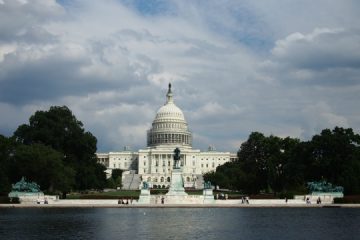
Congress passed the Global Magnitsky Act as part of the National Defense Authorization Act for 2017. The Magnitsky Act gives[…]
Read more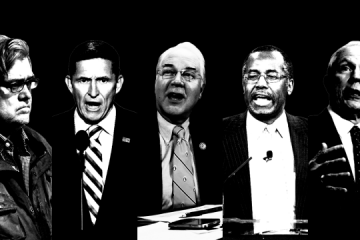
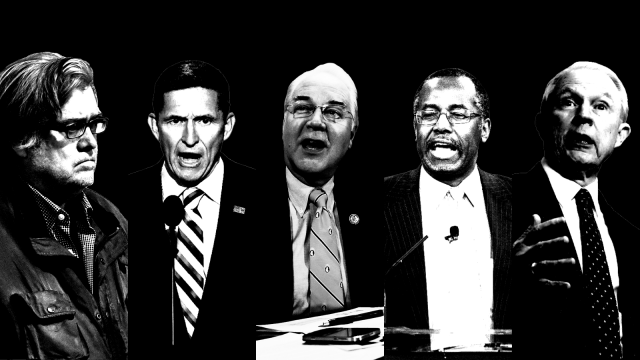
Since Donald Trump was elected more than a month ago, he has assembled a group of anti-LGBTQ officials as his top picks for his administration and transition team. While all cabinet members are all subject to Congressional approval, every single appointee deserves to be thoroughly vetted. And amongst his cabinet picks are three individuals with particularly troubling anti-LGBTQ records: Senator Jeff Sessions, Rep. Tom Price and Ben Carson.
One of the first nominees Trump named was vehemently anti-LGBTQ Alabama Senator Sessions to be U.S. Attorney General. If confirmed, Sessions would lead the U.S. Department of Justice, which is tasked with the fair and impartial administration of justice. Sessions voted against the Matthew Shepard and James Byrd Jr. Hate Crimes Prevention Act, saying it “has been said to cheapen the civil rights movement.”
Sessions received a zero on HRC’s congressional scorecard, and the ACLU characterizes his voting record as anti-civil rights. This troubling appointment is in stark contrast with Trump’s pledge to be a “president for all Americans.”
Sessions has:
Late last month, Trump named Tom Price as his choice for Secretary of Health and Human Services. Price, who would lead the 80,000-person Department, earned a score of “zero” on the past three HRC Congressional Scorecards.
Price opposes protections for transgender students in public schools and said the Supreme Court’s Obergefell decision resulted in “a sad day for marriage” and “judicial destruction of our entire system of checks and balances.”
Price has:
Last week, Trump named retired neurosurgeon Ben Carson, an outspoken opponent of LGBTQ equality, to run the Department of Housing and Urban Development.
During an interview with Sean Hannity, Carson compared LGBTQ marriage to bestiality stating, “Well, my thoughts are that marriage is between a man and a woman. It’s a well-established, fundamental pillar of society and no group, be they gays, be they NAMBLA, be they people who believe in bestiality, it doesn’t matter what they are, they don’t get to change the definition.”
Carson has:
Other recent picks include Rex Tillerson as Secretary of State, Andrew Puzder as Secretary of Labor and Betsy DeVos as Secretary of Education.
Two White House advisers who will not need Senate approval are Steve Bannon, who President-elect Trump tapped as his White House chief strategist, and Lt. Gen. Michael Flynn as National Security Adviser.
Bannon is well versed in attacking others, including LGBTQ people. Bannon said during a 2011 radio interview that conservative women are vilified because they are not “a bunch of dykes that came from the Seven Sisters schools.”
Bannon has:
Last month, Trump announced that retired U.S. Army Lieutenant General Michael Flynn as his pick for National Security Advisor. Flynn has history of animus toward LGBTQ people, most recently launching a vile attack on transgender people at the Republican National Convention in July during his prime time appearance.
“War is not about bathrooms,” he said. “War is not about political correctness or words that are meaningless.”
Flynn has:
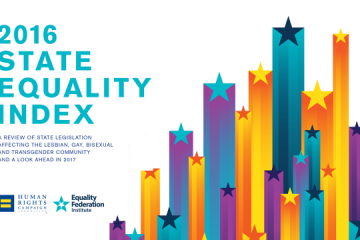
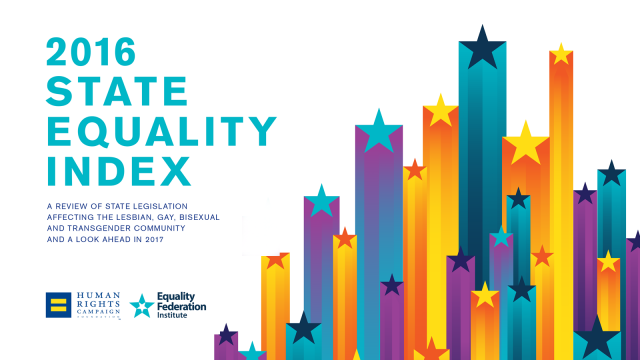
Despite significant progress over the last decade, many states are targeting the LGBTQ community with discriminatory legislation, according to a report released today by the Human Rights Campaign (HRC) Foundation, the educational arm of the nation’s largest lesbian, gay, bisexual, transgender and queer (LGBTQ) civil rights organization. The report comes just a week after North Carolina’s Governor Pat McCrory conceded defeat in his re-election bid after signing and championing the notoriously anti-LGBTQ HB2 — becoming the only incumbent governor to lose this fall.
HRC’s State Equality Index (SEI), issued in partnership with the Equality Federation, the national partner to state-based equality organizations, also reveals that in many states, opponents of equality are ramping up efforts to sanction discrimination against LGBTQ people by proposing state-level laws that would undermine existing protections, erode marital rights of legally-married same-sex couples, target transgender people — particularly youth — and limit the ability of cities and towns to pass their own inclusive laws. This coming year, HB2-style, anti-LGBTQ legislation are expected in several legislatures, including Texas, Tennessee, West Virginia, and Arkansas. Potentially dozens of discriminatory bills are expected in the State of Texas alone.
“State governments have a clear choice between sowing the seeds of division and discrimination or building an economy that works for everyone by fostering fairness and inclusion,” said HRC President Chad Griffin. “Unfortunately, too many lawmakers have decided to target LGBTQ people for state-sanctioned discrimination and to interfere with local protections for workers, customers, and residents. Now more than ever, it is crucial that legislators across the country stand on the right side of history and ensure full equality for all their citizens – nothing more and nothing less.”
During the 2016 legislative sessions, more than 200 anti-LGBTQ bills were introduced in states across the country. While the vast majority of harmful bills were defeated this year, states such as Mississippi and North Carolina did adopt discriminatory legislation. Mississippi’s HB 1523 grants a wide-ranging license to discriminate against LGBTQ people and North Carolina’s HB 2 forbids many transgender people from accessing shared facilities in accordance with their gender identity, among other discriminatory components.
In both instances, federal judges have blocked enforcement of parts of those bills. In North Carolina, the backlash against several elected officials who championed HB2 demonstrated that supporting anti-LGBTQ bills is a political liability.
While more than 111 million people live in states where LGBTQ people lack clear state-level protections against discrimination in the workplace, the SEI points to a few encouraging signs — particularly in areas related to LGBTQ youth, health and safety. States like Vermont and New York took steps to protect LGBTQ youth by banning conversion therapy. Massachusetts expanded the state’s non-discrimination law to include gender identity in public accommodations. Hawaii passed a law to make it easier for transgender residents to update their name and gender marker on a birth certificate or driver’s license. Five states, including Delaware, Hawaii, Maryland, Michigan and Pennsylvania banned transgender exclusions in health care insurance, a sizable increase from 2015.
“Last year our community faced a barrage of attacks on our freedoms, but we are more united and better prepared than ever to continue our momentum toward equality for all,” said Rebecca Isaacs, executive director of Equality Federation Institute. “This report serves as an important tool for advocates to keep pushing forward. We’re not going to stop until all LGBTQ people and their families are able to reach their full potential, free from discrimination, no matter what state they live in.”
The SEI assesses statewide LGBTQ-related legislation and policies — both positive and negative — in five areas: parenting laws and policies, non-discrimination laws and policies, hate crimes laws, youth-related laws and policies and health and safety laws and policies. Based on that review, the SEI assigns states to one of four distinct categories.
Nine states and the District of Columbia are in the highest-rated category, “Working Toward Innovative Equality”
California, Colorado, Connecticut, District of Columbia, Illinois, Massachusetts, New York, Oregon, Vermont, Washington
These states and the nation’s capital have robust LGBTQ non-discrimination laws covering employment, housing and public accommodations, as well as protections in the areas of credit, insurance and jury selection. Most allow transgender people to change official documents to reflect their gender identity, and almost all bar private insurers from banning transition-related healthcare. LGBTQ youth are protected by anti-bullying laws, as well as innovative measures in some states that address conversion therapy, inclusive juvenile justice policies, homelessness and sexual health education.
Seven states are in the category “Solidifying Equality”
Delaware, Iowa, Maine, Minnesota, Nevada, New Jersey and Rhode Island
These states have non-discrimination protections and are considered high-performing, but have not yet adopted innovative equality measures. Many of these states allow transgender individuals to change gender markers on official documents and more than half do not allow second-parent adoption. These states have relatively robust anti-bullying laws, but bad laws begin to crop up in this category.
Six states are in the category “Building Equality”
Hawaii, Maryland, New Hampshire, New Mexico, Utah and Wisconsin
These states have taken steps toward more robust LGBTQ equality, including passing basic non-discrimination and hate crimes laws. They allow gender markers to be changed on official documents, but have few protections guaranteeing access to transgender health care. Some lack explicit gender identity protections and several lack comprehensive anti-bullying laws. Bad laws are more common, so advocates are working to stop bills that could undermine LGBTQ equality and pass more comprehensive non-discrimination laws.
Twenty-eight states are in the lowest-rated category “High Priority to Achieve Basic Equality”
Alabama, Alaska, Arizona, Arkansas, Florida, Georgia, Idaho, Indiana, Kansas, Kentucky, Louisiana, Michigan, Mississippi, Missouri, Montana, Nebraska, North Carolina, North Dakota, Ohio, Oklahoma, Pennsylvania, South Carolina, South Dakota, Tennessee, Texas, Virginia, West Virginia and Wyoming
Most of these states, including Arizona, North Carolina, South Dakota and Florida, have many laws that undermine LGBTQ equality, from those that criminalize HIV and sodomy, to measures allowing religious-based discrimination against LGBTQ people. None have non-discrimination laws that explicitly include sexual orientation or gender identity protections; few have hate crime laws with those protections. LGBTQ advocates largely work to defeat bad bills and pass municipal protections for LGBTQ people.
The full report, including detailed scorecards for every state, as well as a comprehensive review of 2016 state legislation, is available online at www.hrc.org/sei.
Read more
HRC today slammed suspended Alabama Chief Justice Roy Moore for his last-ditch appeal to the Alabama Court of the Judiciary to restore his salary and ability to participate in legal decisions.
“This is the desperate final act of Roy Moore’s failed campaign to restore his position on the Alabama Supreme Court after flagrantly and willfully attempting to block marriage equality at every turn,” said Eva Kendrick, state manager for the Human Rights Campaign, Alabama. “Roy Moore is wasting the court’s time and Alabama taxpayer money, and we urge members of the Court of the Judiciary to stand by their decision.”
In September, the Alabama Court of the Judiciary suspended Moore from the bench for the remainder of his term, due to his unethical and extralegal actions surrounding marriage equality. The decision allowed Moore to remain on the bench, but stripped him of his salary and ability to participate in the court’s legal decisions. Moore’s term is up in 2018, and he will be unable to run for the office of Supreme Court justice again in Alabama as he will be past the office’s age restriction. The nine-member Court of the Judiciary found Moore unanimously guilty of all six charges brought against him.
Earlier this year, HRC Alabama initiated the #NoMoore campaign to remove Moore from the Alabama Supreme Court for his blatant legal and ethical failings. HRC Alabama called out Moore’s discriminatory behavior with a billboard in downtown Montgomery, and held rallies and press conferences outside each of Moore’s ethics hearings. This marks the second time Moore has faced negative consequences for pushing his personal agenda from the state’s highest court.
Read more